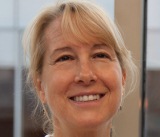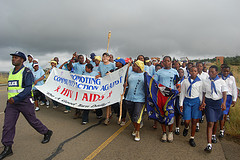Peace Corps Volunteers Contribute to Sustainable Responses to the HIV/AIDS Epidemic
Topics

Today, a major area of Volunteer service is the health sector, which is second only to Peace Corps' work in education. With the Peace Corps serving as an implementing agency of the President's Emergency Plan for AIDS Relief (PEPFAR), a growing number of Volunteers conduct activities in HIV/AIDS prevention, care, and support. Last year alone, 52 percent of all Peace Corps Volunteers engaged in such work in communities overseas. In 2013, through the Global Health Service Partnership, we look forward to placing doctors and nurses as adjunct faculty in training institutions in Africa.
As so many of us know, HIV/AIDS has no borders or boundaries. It can affect communities at every level of our global family. For the Peace Corps, we know that the epidemic has an impact beyond just our work in health.
That is why Volunteers working in other areas like agriculture, business development, environment, and youth development also contribute to our global response to the epidemic. Every day, our Volunteers find sustainable and creative ways to fight this epidemic.

- Helping parents to improve their livelihoods for their families by improving access to clean water, introducing new farming and food generation techniques, and demonstrating safer ways to use cook stoves.
- Creating and implementing innovative HIV prevention content and curricula into English and science lessons.
- Partnering with local community groups to support orphans, vulnerable children, and people living with AIDS.
- Teaching new mothers simple techniques for pasteurizing milk and monitoring baby nutrition and weight.
- Leading camps for young women, "Girls Leading Our World" (GLOW), and helping teach them to be healthy, safe, and strong in their communities.
Please visit www.peacecorps.gov/aids2012 for more information about Volunteer projects and about Peace Corps activities taking place in conjunction with the AIDS2012 conferenceExit Disclaimer.
Editor's Note: For information on the US Government's activities at the conference please visit USG@AIDS2012.